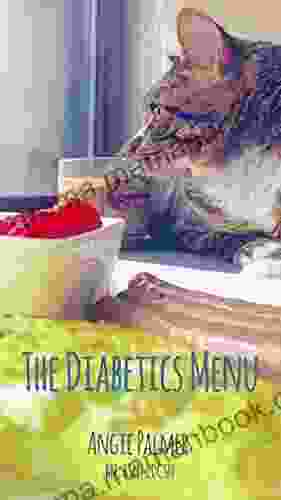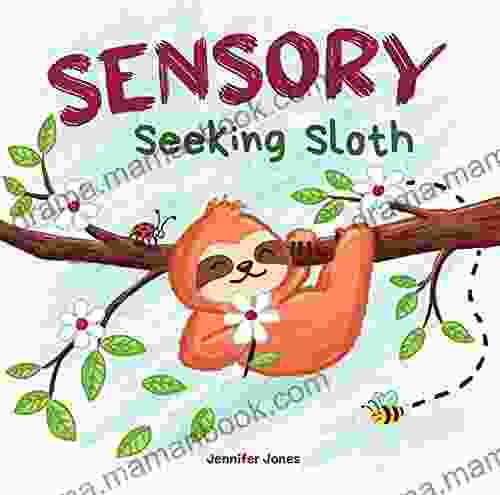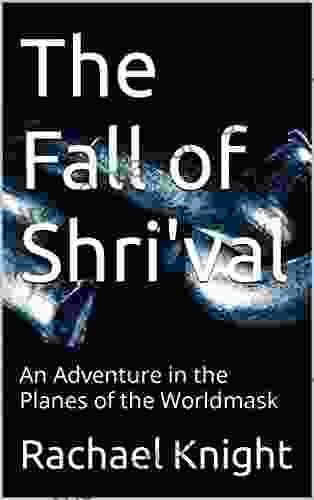Sensory Processing Disorder: A Comprehensive Guide to Sensory Diet for Kids and Adults of All Ages

Sensory processing disorder (SPD) is a condition that affects the way the brain processes sensory information. This can lead to a variety of symptoms, including difficulty with motor skills, social interactions, and emotional regulation.
4.9 out of 5
| Language | : | English |
| File size | : | 10841 KB |
| Print length | : | 35 pages |
| Lending | : | Enabled |
| Screen Reader | : | Supported |
Sensory diet is a type of therapy that can help people with SPD improve their sensory processing skills. A sensory diet consists of a variety of activities that are designed to stimulate or calm the sensory system. These activities can include anything from playing with toys to listening to music to taking a walk in nature.
There is no one-size-fits-all sensory diet, as the best approach will vary depending on the individual's needs. However, there are some general tips that can help you create a sensory diet that is effective for your child or yourself.
Tips for Creating a Sensory Diet
- Start slowly. Don't overwhelm your child or yourself with too many activities at once. Start with a few simple activities and gradually add more as your child or yourself becomes more comfortable.
- Be consistent. Sensory diet activities should be done on a regular basis in order to be effective. Try to schedule activities at the same time each day, or at least a few times per week.
- Be creative. There are endless possibilities when it comes to sensory diet activities. Don't be afraid to experiment and find activities that your child or yourself enjoys.
- Be patient. It takes time to see results from sensory diet therapy. Be patient with your child or yourself and keep at it.
Sensory Diet Activities
There are a wide variety of sensory diet activities that can be used to help people with SPD improve their sensory processing skills. Some of the most common activities include:
- Sensory play. Sensory play activities are designed to stimulate the senses and help children learn about their environment. These activities can include playing with sand, water, slime, or other sensory materials.
- Music therapy. Music therapy can be used to help people with SPD improve their sensory processing skills, as well as their social and emotional skills. Music therapy activities can include listening to music, playing instruments, or singing.
- Massage. Massage can be used to help people with SPD relax and improve their body awareness. Massage techniques can be varied to meet the individual's needs.
- Weighted blankets. Weighted blankets can provide deep pressure input, which can be calming for people with SPD. Weighted blankets can be used during sleep or during other activities.
- Fidget toys. Fidget toys can provide tactile stimulation and help people with SPD self-regulate. Fidget toys can be used during school, work, or other activities.
Sensory Diet for Kids
Sensory diet activities can be especially beneficial for children with SPD. These activities can help children improve their motor skills, social skills, and emotional regulation. Some of the most common sensory diet activities for kids include:
- Playing with sensory bins. Sensory bins are filled with a variety of sensory materials, such as sand, water, beans, or rice. Children can play with the materials in the bin to explore their senses and learn about their environment.
- Building with blocks. Blocks are another great way for children to explore their senses and learn about their environment. Children can build towers, houses, or other structures with blocks, which can help them develop their motor skills and spatial reasoning skills.
- Playing with play dough. Play dough is a soft, pliable material that can be used to create a variety of shapes and objects. Playing with play dough can help children develop their fine motor skills and creativity.
- Listening to music. Music can be a calming and stimulating activity for children with SPD. Children can listen to music, dance to music, or play musical instruments.
- Getting a massage. A massage can be a relaxing and calming activity for children with SPD. Massages can be given by a parent, therapist, or other caregiver.
Sensory Diet for Adults
Sensory diet activities can also be beneficial for adults with SPD. These activities can help adults improve their sensory processing skills, as well as their social and emotional skills. Some of the most common sensory diet activities for adults include:
- Taking a walk in nature. Spending time in nature can be calming and stimulating for people with SPD. Walking in nature can help people to connect with their environment and improve their overall well-being.
- ng yoga or tai chi. Yoga and tai chi are both mind-body practices that can help people with SPD improve their body awareness and self-regulation skills.
- Getting a massage. A massage can be a relaxing and calming activity for adults with SPD. Massages can be given by a spouse, partner, friend, or other caregiver.
- Listening to music. Music can be a calming and stimulating activity for adults with SPD. Adults can listen to music, dance to music, or play musical instruments.
- Using fidget toys. Fidget toys can provide tactile stimulation and help adults with SPD self-regulate. Fidget toys can be used during work, school, or other activities.
Sensory diet is a type of therapy that can help people with SPD improve their sensory processing skills. A sensory diet consists of a variety of activities that are designed to stimulate or calm the sensory system. There is no one-size-fits-all sensory diet, as the best approach will vary depending on the individual's needs. However, there are some general tips that can help you create a sensory diet that is effective for your child or yourself.
If you are interested in learning more about sensory diet, there are a number of resources available online and in your community. You can also talk to your child's doctor or therapist about sensory diet options.
4.9 out of 5
| Language | : | English |
| File size | : | 10841 KB |
| Print length | : | 35 pages |
| Lending | : | Enabled |
| Screen Reader | : | Supported |
Do you want to contribute by writing guest posts on this blog?
Please contact us and send us a resume of previous articles that you have written.
 Top Book
Top Book Novel
Novel Fiction
Fiction Nonfiction
Nonfiction Literature
Literature Paperback
Paperback Hardcover
Hardcover E-book
E-book Audiobook
Audiobook Bestseller
Bestseller Classic
Classic Mystery
Mystery Thriller
Thriller Romance
Romance Fantasy
Fantasy Science Fiction
Science Fiction Biography
Biography Memoir
Memoir Autobiography
Autobiography Poetry
Poetry Drama
Drama Historical Fiction
Historical Fiction Self-help
Self-help Young Adult
Young Adult Childrens Books
Childrens Books Graphic Novel
Graphic Novel Anthology
Anthology Series
Series Encyclopedia
Encyclopedia Reference
Reference Guidebook
Guidebook Textbook
Textbook Workbook
Workbook Journal
Journal Diary
Diary Manuscript
Manuscript Folio
Folio Pulp Fiction
Pulp Fiction Short Stories
Short Stories Fairy Tales
Fairy Tales Fables
Fables Mythology
Mythology Philosophy
Philosophy Religion
Religion Spirituality
Spirituality Essays
Essays Critique
Critique Commentary
Commentary Glossary
Glossary Bibliography
Bibliography Index
Index Table of Contents
Table of Contents Preface
Preface Introduction
Introduction Foreword
Foreword Afterword
Afterword Appendices
Appendices Annotations
Annotations Footnotes
Footnotes Epilogue
Epilogue Prologue
Prologue Antonin Scalia
Antonin Scalia Joshua Hood
Joshua Hood Joan Wiley
Joan Wiley Michelle Robinson
Michelle Robinson Sheena Boekweg
Sheena Boekweg Susan Hatler
Susan Hatler Jack Mullen
Jack Mullen Todd Miller
Todd Miller John Kenney
John Kenney Nisha Vora
Nisha Vora Gavin T L Brown
Gavin T L Brown Denis Johnson
Denis Johnson William Thomas Brumley
William Thomas Brumley Tony Harrison
Tony Harrison Christof Paar
Christof Paar Tejaswini Niranjana
Tejaswini Niranjana Amy Mackelden
Amy Mackelden D C Kinder
D C Kinder T A Williams
T A Williams Deborah Harkness
Deborah Harkness
Light bulbAdvertise smarter! Our strategic ad space ensures maximum exposure. Reserve your spot today!
 Jermaine PowellFollow ·14.4k
Jermaine PowellFollow ·14.4k Allan JamesFollow ·13.8k
Allan JamesFollow ·13.8k Allen ParkerFollow ·17.8k
Allen ParkerFollow ·17.8k John ParkerFollow ·2.5k
John ParkerFollow ·2.5k Alvin BellFollow ·2.4k
Alvin BellFollow ·2.4k Emmett MitchellFollow ·8.9k
Emmett MitchellFollow ·8.9k Darius CoxFollow ·6.6k
Darius CoxFollow ·6.6k Roger TurnerFollow ·7.5k
Roger TurnerFollow ·7.5k

 Jesus Mitchell
Jesus MitchellThe Diabetics Menu: Your Low Carb Options
If you're living with diabetes, you may be...

 Danny Simmons
Danny SimmonsThe Sam Reilly Collection: A Treasure Trove of...
In the realm of...

 Vic Parker
Vic ParkerThe Shepherdess of Siena: The Extraordinary Life of Saint...
Catherine of Siena, known as the...

 Christian Carter
Christian CarterDive into the Mystical World of Meraki Syren: A Literary...
A Literary Odyssey Through the Depths...

 Eric Hayes
Eric HayesSimplest Method on How to Remove Credit Cards from Your...
Do you have multiple credit cards...
4.9 out of 5
| Language | : | English |
| File size | : | 10841 KB |
| Print length | : | 35 pages |
| Lending | : | Enabled |
| Screen Reader | : | Supported |














